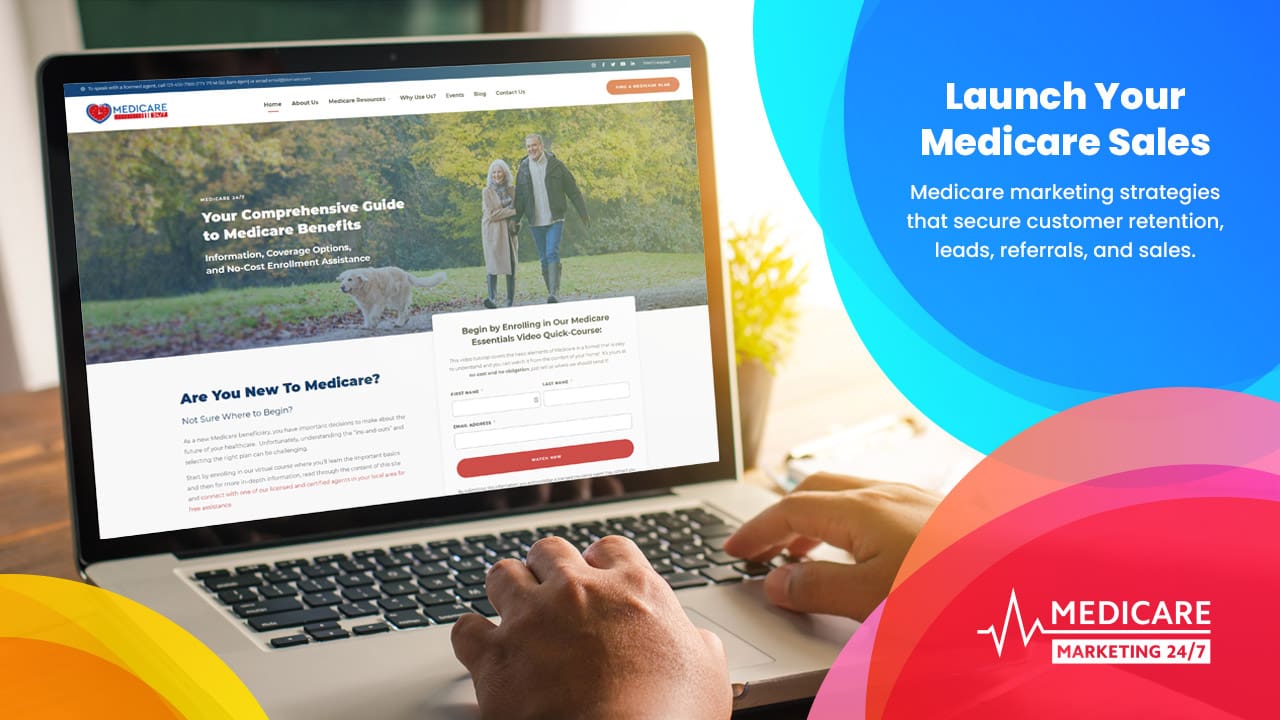In the competitive landscape of Medicare sales, referrals can be a game-changer for agents seeking to expand their client base.
This comprehensive guide will delve into the intricacies of Medicare referral compliance, effective marketing strategies, and the role of incentives in driving client referrals. As a Medicare agent, understanding these key aspects is essential for achieving success in the industry.

Understanding Medicare Referral Compliance
In the complex world of Medicare sales, compliance is not just a buzzword; it’s a necessity. Health insurance agents must adhere to strict rules outlined by the Centers for Medicare & Medicaid Services (CMS). Medicare referral compliance ensures that agents operate within the guidelines, preventing the use of prohibited marketing materials and strategies. This includes restrictions on offering incentives, using certain phrases, and more. Agents cannot risk non-compliance, as it could lead to the loss of their license. Therefore, it’s crucial to understand the guidelines and navigate them meticulously.
Crafting a Strategic Marketing Plan for Medicare Sales
Successful Medicare sales hinge on effective marketing strategies. Agents must utilize various channels, including email, social media, websites, and traditional methods, to generate leads and reach potential clients. Creating a compelling business card and leveraging marketing events can enhance visibility and credibility. However, agents should be aware of the strict marketing guidelines set by CMS. It’s essential to strike a balance between promoting services and ensuring compliance.
In the fiercely competitive realm of Medicare sales, the importance of a well-crafted marketing plan cannot be overstated. Success in this industry goes beyond product knowledge and sales skills—it requires a strategic approach to reaching and engaging potential clients. Let’s delve into the intricacies of crafting a strategic marketing plan that not only generates leads but also ensures compliance with the stringent guidelines set by the Centers for Medicare & Medicaid Services (CMS).
Diversifying Channels for Maximum Reach
Effective marketing for Medicare sales involves a multi-channel approach. Agents must leverage a mix of digital and traditional methods to maximize their reach. Utilizing email campaigns allows for direct communication with potential clients, providing them with valuable information about Medicare plans and services. A professional and informative website acts as a virtual storefront, offering a comprehensive overview of an agent’s services and creating a platform for potential clients to make informed decisions.
In addition to the digital realm, traditional methods such as direct mail, community events, and networking can still be highly effective. Crafting a holistic marketing strategy that combines online and offline channels ensures that agents can connect with a diverse audience.
Elevating Visibility and Credibility
A compelling business card is a tangible representation of an agent’s brand and services. It serves as a powerful tool for leaving a lasting impression on potential clients. A well-designed business card, complete with contact information and a concise tagline, can be a catalyst for brand recall. In an industry where trust and credibility are paramount, a professional and polished business card can set an agent apart from the competition.
Moreover, leveraging marketing events is a strategic way to enhance visibility within the community. Hosting informational seminars or participating in local health fairs not only provides valuable information to attendees but also positions the agent as a trusted expert in the field. Establishing a presence at such events contributes to community engagement and reinforces the agent’s credibility.
Navigating Strict CMS Marketing Guidelines
While marketing is essential for business growth, agents must navigate the regulatory landscape outlined by CMS. The guidelines are designed to protect consumers and maintain the integrity of the Medicare system. Agents must be well-versed in these rules to ensure compliance in every aspect of their marketing efforts.
For example, CMS prohibits misleading information, aggressive sales tactics, and the use of certain phrases that may create confusion among beneficiaries. Striking a balance between promoting services and adhering to these guidelines is paramount. Agents should regularly review and update their marketing materials to align with the latest CMS requirements, mitigating the risk of non-compliance.
Balancing Promotion and Compliance
Crafting a strategic marketing plan for Medicare sales requires a delicate balance between promoting services and adhering to compliance standards. Agents must avoid making exaggerated claims or using language that could mislead potential clients. Clear and transparent communication about the benefits of Medicare plans, without crossing the boundaries set by CMS, is key.
Incorporating educational content into marketing materials is an effective way to provide value to potential clients while staying compliant. Agents can create informative blog posts, videos, or downloadable resources that help individuals understand the complexities of Medicare. This approach not only positions the agent as an authority in the field but also fosters trust with the audience.
In conclusion, crafting a strategic marketing plan for Medicare sales is a nuanced process that involves diversifying channels, enhancing visibility, and navigating compliance guidelines. By embracing a multi-faceted approach that combines digital and traditional methods, agents can build a robust and compliant marketing strategy that resonates with potential clients and sets the stage for sustainable business growth.

Incentives: Igniting Client Referrals
In the realm of Medicare sales, where word of mouth can be a potent force, harnessing the power of incentives becomes a strategic imperative for agents. The art of encouraging client referrals lies in understanding how incentives can serve as catalysts, propelling satisfied clients to become enthusiastic advocates. However, in this arena, navigating the regulatory landscape set by the Centers for Medicare & Medicaid Services (CMS) is crucial to avoid pitfalls while offering rewards.
The Motivational Power of Incentives
Incentives, when thoughtfully chosen and ethically presented, have the remarkable ability to motivate clients to become proactive ambassadors for an agent’s services. The psychology behind incentives lies in reciprocation – clients who have received value are more likely to reciprocate by referring friends and family. This reciprocity is the heartbeat of a thriving referral-based business.
Compliant Rewards: A Delicate Balancing Act
While CMS places restrictions on certain types of incentives, agents can still employ compliant rewards to foster client referrals. The key is to strike a delicate balance between offering meaningful incentives and adhering to regulatory guidelines. Understanding the permissible options is essential, and agents should remain vigilant in ensuring that their incentive programs align with CMS regulations.
Small Tokens, Big Impact
A small, compliant gift can go a long way in expressing appreciation to clients for their loyalty and advocacy. Whether it’s a personalized thank-you card, a useful branded item, or a token of gratitude, these gestures reinforce the agent-client relationship. These small tokens not only serve as tangible reminders of the agent’s commitment but also create positive associations that make clients more likely to refer others.
Raffles: Building Excitement and Engagement
Introducing a chance to win a raffle adds an element of excitement to the referral process. This method not only complies with CMS regulations but also engages clients in a way that extends beyond the transactional. Raffles create anticipation, and the opportunity to win something valuable adds an extra layer of motivation for clients to actively participate in the referral process. It transforms the act of referral into a collaborative and enjoyable experience.
Striking the Right Balance
The crux of successful incentive programs lies in striking the right balance between motivating clients and staying compliant. Agents must be discerning in their choices, ensuring that incentives are perceived as genuine gestures of appreciation rather than manipulative tactics. The goal is to create a win-win situation – clients feel valued, and agents benefit from increased referrals.
Building Trust Through Transparency
Transparency is paramount when implementing incentive programs. Agents should openly communicate the nature of the incentives, ensuring clients understand the rules and guidelines. Clearly stating the eligibility criteria and the process for earning incentives fosters trust and reinforces the agent’s commitment to ethical business practices.
Long-Term Impact on Referral Culture
Effective incentive programs are not just about short-term gains; they contribute to the development of a referral culture. By consistently recognizing and rewarding clients for their referrals, agents cultivate an environment where satisfied clients become active advocates for the agent’s services. This cultural shift has enduring benefits, as clients are more likely to continue referring others over the long term.
In conclusion, incentives serve as a powerful catalyst for client referrals in the Medicare sales landscape. By understanding the motivational dynamics, offering compliant rewards, and striking the right balance between appreciation and compliance, agents can transform satisfied clients into enthusiastic advocates. Incentive programs, when executed thoughtfully, not only drive business growth but also foster a culture of loyalty and collaboration that extends far beyond individual transactions.

Unlocking the Power of Client Referrals in Insurance Sales
In the dynamic and competitive landscape of insurance sales, particularly within the realm of Medicare, the value of client referrals cannot be overstated. A satisfied client is not merely a closed deal but a potential gateway to a wealth of untapped opportunities. Successful insurance agents recognize that actively seeking referrals, leveraging positive relationships, and employing a strategic “word of mouth” approach can transform satisfied clients into the most powerful advocates for an agent’s success.
The Role of Satisfied Clients
At the heart of every successful insurance practice lies a satisfied client. These individuals are not just policyholders; they are the embodiment of trust and confidence in an agent’s services. A satisfied client is, without a doubt, an agent’s best advocate, and their positive experiences can reverberate throughout their network, creating a ripple effect of referrals.
Proactive Referral Solicitation
Waiting passively for clients to refer others is a missed opportunity for agents. Instead, successful agents adopt a proactive approach, actively seeking referrals as a natural extension of their service. This involves integrating referral requests strategically into the post-sale process, capitalizing on moments when client satisfaction is at its peak. By making referrals a part of ongoing conversations, agents increase the likelihood of clients willingly sharing their positive experiences with others.
Leveraging Positive Relationships
Building lasting and meaningful relationships with clients is a cornerstone of successful insurance practices. Beyond the transactional nature of insurance, agents who invest time and effort in understanding their clients’ unique needs and providing personalized solutions foster a sense of trust. Positive relationships form the foundation upon which referral opportunities are built. Clients are more likely to refer others to an agent they perceive as a trusted advisor rather than merely a service provider.
The Strategic “Word of Mouth” Approach
The timeless “word of mouth” strategy remains a powerful force in the world of insurance sales. When clients share their positive experiences with friends, family, or colleagues, it creates a chain reaction of referrals. This organic and authentic form of recommendation is particularly potent in an industry where trust is paramount. Successful agents understand the significance of this strategy and actively cultivate an environment where clients feel compelled to share their positive experiences.
Impact on Lead Generation
Client referrals are more than just warm leads—they are prequalified opportunities. Clients who refer others often do so with a deep understanding of the referred individuals’ needs and preferences. This intrinsic knowledge streamlines the sales process, making it more efficient and increasing the likelihood of conversion. The impact on lead generation is not just quantitative; it’s qualitative, as referred clients often come with a higher level of trust and confidence.
Cultivating a Referral-Centric Culture
Encouraging clients to share positive experiences and refer others requires the cultivation of a referral-centric culture within an insurance practice. This involves consistently emphasizing the value of referrals during client interactions, expressing gratitude for referrals received, and, when appropriate, implementing a structured referral incentive program. Creating an environment where clients feel not only comfortable but also motivated to refer others is a key component of long-term success.
The Long-Term Impact on Success
The long-term impact of client referrals on an agent’s success is profound. Beyond the immediate benefits of lead generation and increased conversion rates, cultivating a network of satisfied clients-turned-advocates contributes to a self-sustaining cycle of success. A stream of referrals creates a predictable and consistent client acquisition pipeline, allowing agents to spend less time prospecting and more time building relationships and closing deals.
In conclusion, client referrals represent a goldmine for insurance agents, providing a strategic avenue for sustainable success. By actively seeking referrals, leveraging positive relationships, and embracing the enduring power of the “word of mouth” strategy, agents can turn satisfied clients into invaluable advocates. This not only transforms the way agents acquire new business but also fosters a culture of trust, loyalty, and long-term success within the ever-evolving landscape of insurance sales.

Navigating the Evolving Landscape: Future Trends and Predictions for Medicare Referrals
As the Medicare landscape continues to evolve, insurance agents must adopt a forward-thinking approach to anticipate and navigate emerging trends in the industry. The future promises to bring significant shifts, influenced by advancements in technology, changing consumer behaviors, and evolving regulations. To stay ahead, agents need to leverage these trends, embrace digital transformation, and remain vigilant in complying with the guidelines set by the Centers for Medicare & Medicaid Services (CMS).
Technology Integration
The integration of technology is poised to revolutionize the way insurance agents approach Medicare referrals. Artificial intelligence (AI) and data analytics can empower agents with insights into consumer preferences, allowing for more personalized and targeted marketing strategies. Chatbots and virtual assistants may play a role in streamlining client interactions, providing instant information, and enhancing overall customer experience.
Digital Marketing Dominance
In the digital age, an online presence is no longer optional—it’s imperative. Digital marketing channels, such as social media, search engine optimization (SEO), and content marketing, will continue to be primary avenues for reaching and engaging potential Medicare clients. Agents must master the art of creating compelling online content, building brand visibility, and utilizing targeted advertising to stay competitive in the digital marketplace.
Adapting to Changing Consumer Behaviors
Consumer behaviors are dynamic, and agents must adapt their strategies to align with evolving preferences. The modern Medicare beneficiary is likely to be more tech-savvy, seeking information online and engaging with digital tools. Agents should be prepared to cater to these preferences by providing accessible and user-friendly online resources, leveraging educational content, and engaging in meaningful online interactions.
Compliance in a Shifting Regulatory Landscape
The CMS guidelines, a cornerstone of ethical Medicare sales practices, are subject to periodic updates. Agents must remain vigilant in staying informed about any changes to these guidelines. Being proactive in adjusting marketing strategies and client interactions to align with the latest CMS regulations is not only a legal necessity but also a crucial component of maintaining trust and credibility in the eyes of beneficiaries.
Emphasis on Educational Marketing
With consumers becoming more discerning, there is a growing demand for educational content. Agents who position themselves as knowledgeable resources, providing valuable and informative content, will likely stand out in a crowded market. Educational marketing, whether through blogs, webinars, or interactive tools, can not only attract potential clients but also build trust by demonstrating the agent’s expertise in the complex Medicare landscape.
Personalization and Relationship Building
The trend toward personalized services extends to the insurance industry. Agents who can tailor their approach to meet the unique needs of individual clients will likely see increased success. Building and nurturing relationships will be a key differentiator. Establishing trust through personalized interactions, timely communication, and a client-centric approach can lead to not only satisfied clients but also enthusiastic advocates who are more likely to refer others.
Integration of Telehealth Services
The COVID-19 pandemic accelerated the adoption of telehealth services, and this trend is likely to persist. Agents who can effectively communicate the benefits of Medicare plans that include telehealth options may find increased resonance with prospective clients. Understanding the nuances of telehealth coverage and incorporating it into marketing messages can be a valuable asset in the evolving healthcare landscape.
Community Engagement
Building a sense of community around Medicare beneficiaries can be a powerful strategy. Hosting local events, participating in community health fairs, and establishing partnerships with healthcare providers can enhance an agent’s visibility and credibility within the community. This localized approach aligns with the trend of consumers seeking personalized, community-oriented experiences.
The future of Medicare referrals present both challenges and opportunities for insurance agents. By anticipating and embracing emerging trends, leveraging technology, and staying compliant with evolving regulations, agents can position themselves for success in a rapidly changing landscape. Adapting to the shifting dynamics of consumer behavior and fostering personalized, community-centric relationships will be instrumental in not only surviving but thriving in the ever-evolving world of Medicare sales.

In the world of Medicare sales, success is not just about selling policies but also about building lasting relationships and maximizing client referrals.
Agents must prioritize compliance, leverage effective marketing strategies, and embrace the evolving landscape to stay ahead of the competition. As a Medicare agent, navigating the intricacies of referral marketing can lead to a thriving business and a satisfied client base.





